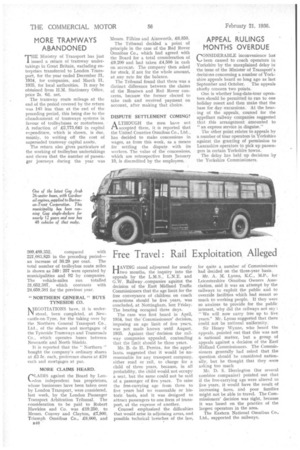Free Travel: Rail Exploitation, Alleged
Page 54

If you've noticed an error in this article please click here to report it so we can fix it.
HAVING stood adjourned for nearly two months, the inquiry into the appeals by the L.M.S., L.N.E. and G.W. Ra'ilway .companies against the decision of the East Midland Traffic Commissioners that the age limit for the free conveyance of children on coach excursions should be five years, was concluded, at Nottingham, last Friday. The hearing occupied three days.
The case was first heard in April, 1934, but theCommissioners' decision, imposing an age limit of five years, was not made known until August, 1935. Against that decision the railway companies appealed, contending that the limit should be three years.
Mr. B. de H. Pereira, for the appellants, suggested that it would be unreasonable for any transport company, either road or rail, to charge for a child of three years, because, in all probability, the child would not occupy a seat, but the same could not be said of a passenger of five years. To raise the free-carrying age from three to five years had no reasonable or historic basis, and it was designed to attract passengers to one form of transport, at the expense of another.
Counsel emphasized the difficulties that would arise in adjoining areas, and possible technical breaches of the law, for quite a number of Commissioners had decided on the three-year basis.
Mr. A. M. Lyons, K.C., M.P., for Leicestershire Omnibus Owners Association, said it was an attempt by the railways to exploit the public and to override facilities which had meant so much to working people. If they were so anxious to provide for the public interest, why did the railways not say : "We will now carry free up to five years." Mr. Lyons suggested that there could not be national uniformity.
Sir Henry Wynne, who heard the appeals, pointed out that this was not a national matter, but a group of appeals against a decision of the East Midland Commissioners. The Commissioners generally had asked that the question should be considered nationally, but he thought that they were asking too much
Mr. D. S. Herrington (for several combine companies) pointed out that if the free-carrying age were altered to five years, it would have the result of increasing fares, and poor families might not be able to travel. The Commissioners' decision was right, because it was based on the practice of the largest operators in the area. The Eastern National Omnibus Co., Ltd., supported the railways.




























































































